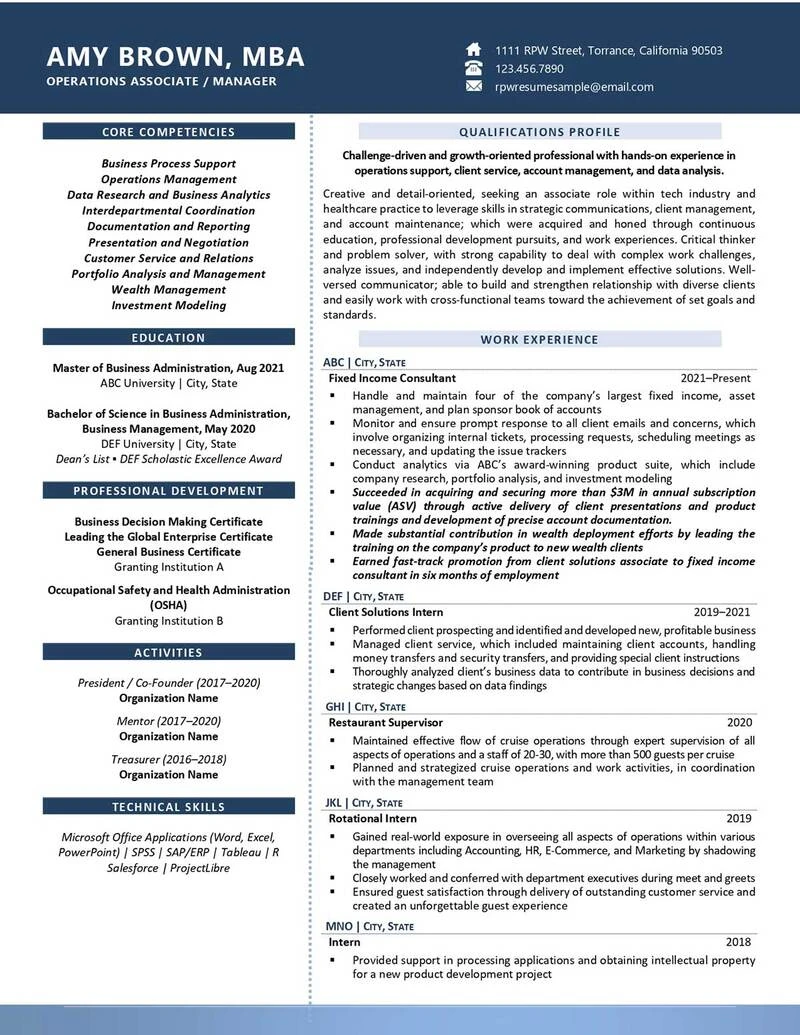A career as an operations manager is a perfect fit for those who enjoy working behind the scenes of a business. Being an operations manager also gives you the flexibility to work practically in any industry. Moreover, it brings a lot of excellent opportunities and perks, including a solid compensation. In fact, according to Payscale, the average annual salary for an operations manager is approximately $69,558; which can still differ significantly depending on your industry, responsibilities, location, and level of experience.
If you are planning to work in the operations management field, good news for you. According to the US Bureau of Labor Statistics (BLS), employment possibilities for operations managers in the US are anticipated to increase by 7% over the next few years. With the many industries that you can work in, an increasing demand for operations manager positions will always exist. This also indicates that finding a job for this role won’t be simple, so you’ll need a good application tool that sets you apart from other applicants.
Not sure how to leave a good and lasting impression on a hiring manager? Read on to learn more about the operations manager role and discover effective tips on how to create a stellar operations manager resume that will showcase your most pertinent skills and abilities to recruiters.
What is an Operations Manager?
An operations manager is an integral member of a management team that oversees high-level management activities concerning a company’s day-to-day operations. They frequently manage multiple departments, balance budgets, and allocate resources to maximize the company’s profitability. They also evaluate and enhance organizational processes in order to boost quality, productivity, and operational efficiency. Apart from that, they especially work on developing firm strategy, improving performance, and guaranteeing legal compliance.
Simply said, an operations manager’s responsibility is to guarantee that all departments within an organization function seamlessly and in unison to achieve the company’s goals.
What are the Duties of an Operations Manager?
Operations managers may be responsible for employee training, inventory management, and business planning and strategy, although their responsibilities may vary based on the needs of the organization. To give you some examples, below are the primary jobs and common responsibilities of this role:
- Plan and organize company events to ensure staff motivation and engagement.
- Establish and implement objectives for increased output and improved efficiency.
- Closely monitor the overall budget of the business as well as departmental costs.
- Build alliances and partnerships with other organizations.
- Develop corporate guidelines and carry out frequent changes while improving workflow and procedure.
- Efficiently handle and resolve disputes between departments about resources and other operational issues.
- Promote a company culture that encourages top performance and high morale.
- Guarantee proper management and filing of all legal and regulatory documents, while ensuring compliance with laws and regulations.

How Do You Become an Operations Manager?
Because of the diverse nature of the operations manager’s job, candidates interested in this career should prepare themselves well for the profession. Here are some steps you could take to become an operations manager:
1. Earn a bachelor’s degree.
The initial requirement for the role of an operations manager is a bachelor’s degree in operations management. A degree in a business-related area can also help you master the principles of running a business. Although not required, you can also pursue a master’s degree to further your business knowledge and increase your chance of getting hired.
2. Take up additional courses and certifications.
Given the increasing demand for operations managers, you must be more competitive in the market if you want to be taken into consideration for the position. Back up your education with additional credentials and enhance your skills by enrolling in operations management business courses and certificates. These certifications and courses will give you the education necessary to enhance your operational excellence, this will also give you an edge in the tight market competition.
3. Gain experience.
Employers in this field are looking for candidates with a clear career path and people management skills. This explains why it is advisable to take on entry-level jobs in your industry to build experience and pave the road for management positions.
🔍 Think Your Resume’s Fine? Let’s Double-Check That
Even strong resumes can miss critical details—especially when it comes to passing Applicant Tracking Systems (ATS). Our specialists offer a free review to uncover gaps, improve formatting, and ensure your resume is ATS-ready and recruiter-friendly.
4. Develop and strengthen your skills.
Since an operations manager is required to oversee all facets of corporate operations, building and developing both your soft and hard talents is essential. For example, working with other teams will improve your communication and leadership skills. Understanding business software and other practical tools is also beneficial and will undoubtedly improve your chances of getting hired.
What to Include in Your Operations Manager Resume
A career as operations manager is a rewarding but challenging profession, since you will have broad responsibilities and require a diverse skill set to satisfy the demands of this position. And as an applicant, you must demonstrate to the hiring manager that you have the necessary skills and expertise if you really want this job.
But how can you build a resume that will catch the hiring manager’s interest? The following are some of the sections that hiring managers expect to see on your operations manager resume:
Contact Information
This is an important part of your operations manager resume since it details how the hiring manager may contact you. In this part, include complete contact information such as your name, mailing address, phone number, and email address. If you have a LinkedIn profile, a professional website, or a profile on an industry-specific networking website, you should also list them in this section for additional reference.
Specific Target Job Position
Also known as the career tag, this section is typically placed immediately after your contact information, where you indicate your target post to tell companies of the employment position you’re applying for.
Qualifications Profile
A qualifications profile, often known as a resume summary, is a section that can help you get the interest of recruiters. Since this is the portion of your resume that is most likely to be read, you should emphasize your qualifications as an operations manager here. Showcase your most valuable abilities, years of experience, achievements, and other skills you can bring to the position in five sentences.
Expert Tip:
When creating your professional summary, stay away from using resume objectives. Instead, use attention-grabbing resume headlines and titles to get the hiring manager’s attention.
Areas of Expertise
Also known as core competencies, this section is commonly used by hiring managers to get a quick rundown of your skills. Therefore, make sure that this section reflects your knowledge and strengths relevant to operations management.
Skills tell the recruiter and hiring manager what you know and how you work. So as much as possible, try to include a mix of soft and hard skills on your operations manager resume.
Related Article:
Professional Experience
Professional or work experience is arguably the section of your resume hiring managers will pay the most attention to, so use it to your advantage. Add the name of your current and previous employers, the location of your workplace, and the dates of your employment. Using bullet points, list your day-to-day duties and achievements under each job.
Education
Along with your qualifications and employment background, the education section of your operations manager resume is also crucial. Most employers consider your academic background in making hiring decisions, so you’ll also need to pitch this information to recruiters. Include the name of the college or university, the degree earned, and the year of graduation. You may also list any academic achievements, such as research, special projects, awards, and other academic activities in this section.
Professional Development
This section plays a critical role in making you stand out from other applicants. Adding professional development activities such as training, certification, and licenses on your resume can help emphasize all of your employable qualities. So, if you have any, be sure to list them on your operations manager resume.
Additional Sections for your Operations Manager Resume
Professional affiliations, extracurricular activities, technical skills, and projects are also good sections that may add value to your operations manager resume. Add them in order to give hiring managers more information that can influence them to hire you.
How to Write Your Operations Manager Resume
No matter the business size, there can be fierce competition for the operations manager role. So aside from knowing the important component of an effective resume, you also need to be thorough in preparing your application tool. The following resume trends and writing strategies will help you make a strong and top-notch operations manager resume:
1. Make a good impression and appearance.
Use a professional layout and font style to format your operations manager resume so that both applicant tracking system (ATS) and human eyes will find it easy to read. White space should be used liberally to help the reader find what they’re looking for. Keep in mind that readers will become frustrated by resumes that are cluttered, complex, or just unsightly. Thus, make sure it’s organized.
2. Apply the best format on your operations manager resume.
Tailor your resume to your target operations manager job using the most suitable resume format. Use the chronological resume format to highlight the years of your experience and subject-matter expertise if you have extensive industry experience. Nonetheless, you might want to think about using alternative resume formats such as functional, targeted, or combination resume styles. It’s imperative to know what format to use that would best highlight the abilities that you can bring to the firm.
3. Highlight your skills relevant to operations management.
Since you’re gunning for a management role, make sure to highlight that you have the ability to manage a team and enhance operational procedures. To show that you are capable of handling a variety of responsibilities, you may also add industry-specific keywords from the job description throughout your operations manager resume. Doing so will also increase your chances of passing the applicant tracking system.
4. Showcase your achievements.
Use action words and powerful phrases to describe your experience and accomplishment to make an impact on your operations manager resume. If you can, quantify these successes using specific numbers and percentages. In a sea of printed words, numbers stand out drawing the reader’s attention and highlighting your successes.
5. Remember to proofread your operations manager resume.
For high-level positions like operations management, recruiters want flawlessly crafted resumes. Hence, make sure to proofread your resume before submitting your application. Although a single typo might not completely ruin your chances, failing to catch serious grammar mistakes might, so you should proofread and reread your CV. If you’re concerned that you’ll forget to check anything important, ask a friend or coworker to do it for you.
Operations Manager Resume Example
Here is an example of an operations manager resume created by one of our expert writers to give you an idea of how one should be written:

Note: For more ideas, browse through our management resume samples.
Let Our Expert Operations Manager Resume Writers Help You Land Your Dream Role!
Operations managers usually possess impressive confidence and competence. But despite having excellent skills and expertise in different business areas, there are a few who have trouble writing a resume that will present their qualifications and credentials well to the hiring manager.
Are you experiencing the same problem? Try to apply our tips on how to write and what to include on your operations manager resume. But if you’re still having trouble writing your own, don’t worry—Resume Professional Writers has got your back! Hire our top resume writing service today to ace your job search and land your dream position as an operations manager!
Contact us today to take the first step toward your career goals.








